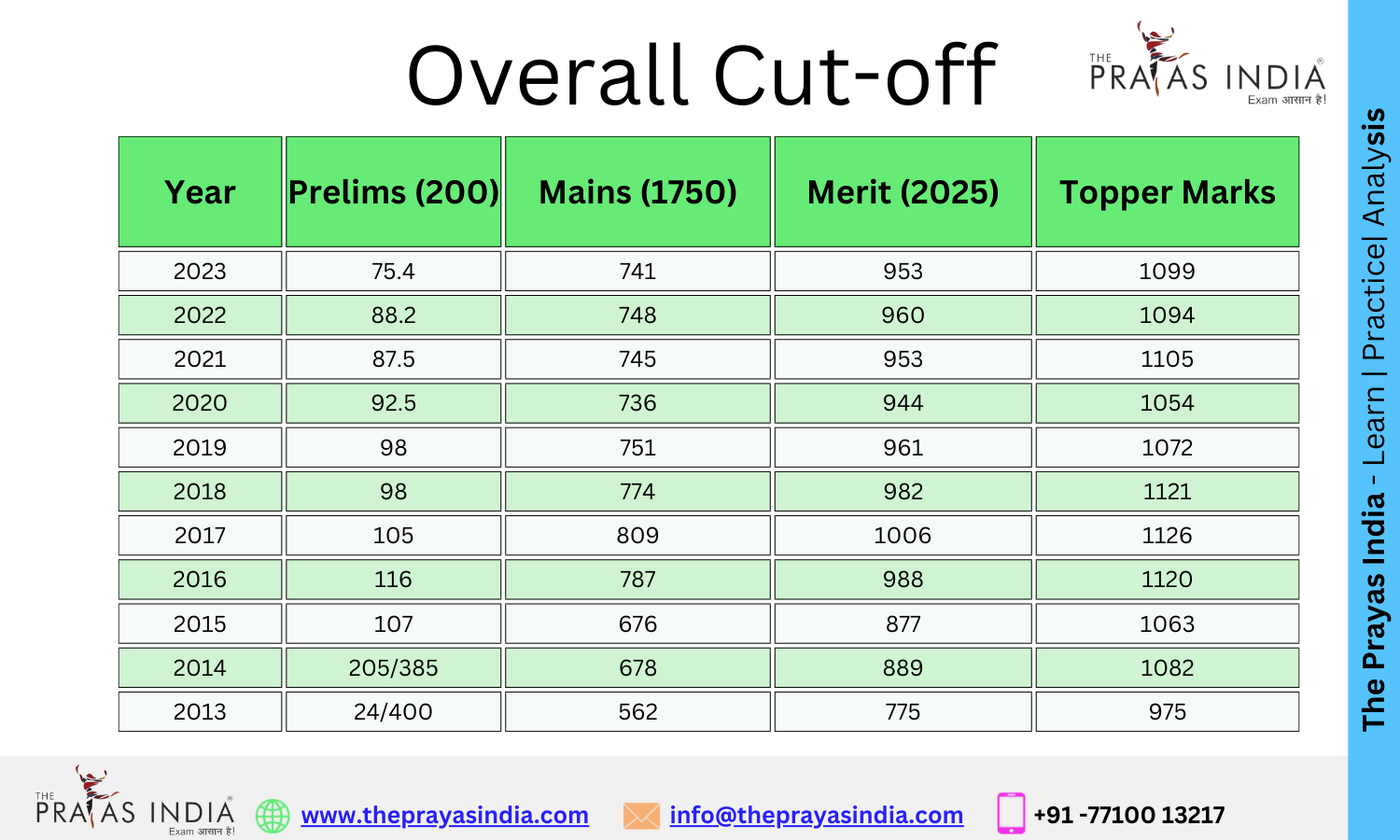The State Executive
The constitution makers decided to adopt the same system of government battle in the states that is the parliamentary system which is there at the union. Need the French is that the constitutional head of the state that is the governor is neither elected directly nor indirectly. He is appointed by the president. part VI of the constitution deals with the government in the states. Articles 153 two 167 in part six of the constitution deal with the state executive. the state executive consists of the governor chief minister Council of Ministers and the Advocate General of the state. and there is no office of vice governor.
Important Articles:
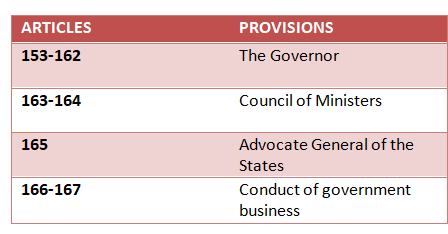
Governor
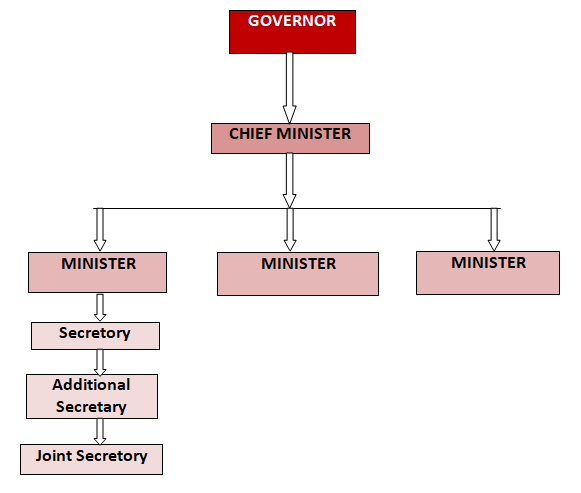
- The governor is the constitutional head of the state government.
- he acts as the head of the state government and also as a link between the centre and the state government.
- being the executive head of the state, the governor acts according to the advice of the Council of Ministers of state.
- All the executive actions are formally taken in the name of the governor.
- it is the duty of the governor who keep the centre informed of the affairs of the state.
- also the governor exercises his discretionary powers independent of his relations with the Council of Ministers in this state and union government.
Important Articles related to Governor:
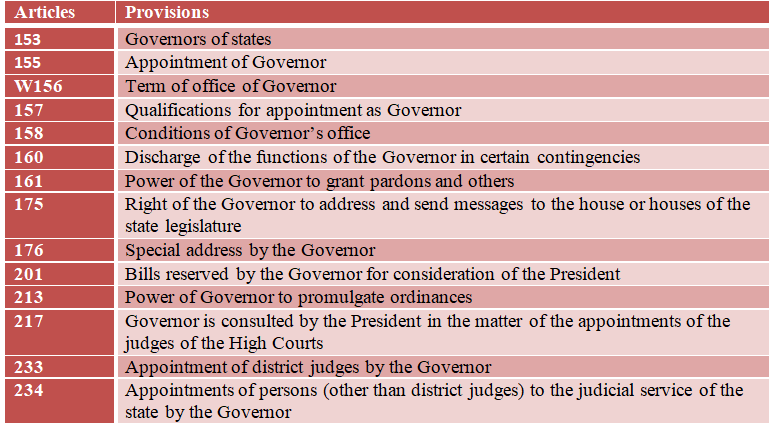
Appointment of the Governor
According to Article 153, there should be a Governor for each State. The 7th Constitutional Amendment Act, 1956, facilitated the appointment of the same person as a Governor for two or more states. The Governor is neither appointed directly by the people nor inderectly by a specified electoral college. The Indian President appoints Governor for each state by warrant under his hand and seal. Central Government is responsible to nominate the governor for each state.
Note:
|
Qualification:
Governor has to meet only two qualifications:
-
-
- He should be an Indian Citizen
- He should be 35 years old or more
-
But two conventions have developed which are kept in mind and should be fulfilled before appointing a person as a Governor:
-
-
- That person does not belong to the state where he is appointed.
- The Chief Minister of the State should be consulted before appointing such a person as the Governor of the State.
-
It is to be noted that both the above conventions are not absolute and have been ignored by the union government in many instances.
Term of Office of the Governor:
The Governor usually holds office for a period of five years but can be removed from office at any time before the completion of five year period by the President. From this it is clear that the Governor holds the office during the pleasure of the President, and his office has no fixed term. President can remove the Governor and the grounds upon which he may be removed are not laid down in the constitution. Governor may also get transferred from one state to another by the President. He also can be reappointed.
The governor may resign at any time by writing to the President. In a contingency for which the Constitution makes no provision, suh as the death of the Governor, the President may make such provisions as he thinks fit for the discharge of the fuctions of the Governor of a State (Article 160).
Note:
|
Conditions of Governor’s Office:
There are a few conditions for a person to be appointed as a Governor:
- He cannot be a member of Parliament or a State Legislature. If he has been a member, then his seat in the Parliament or the State Legislature, as the case may be, will become vacant on the date on which he assumes the office as Governor.
- He should not hold any office of profit during the term of his office.
- Raj Bhavan is provided to him without the payment of rent, which is used as his official residence.
- Parliament decides his emoluments, allowances, and privileges. And when the same governor is appointed for two or more states, the emoluments and allowances payable to him are shared by the states in such proportion as the President may determine.
- His emoluments and allowances should not be diminished during his term of office.
Immunities to the Governor:
- According to Article 361, the governor shall not be answerable to any Court for the exercise and performance of the powers and duties of his office or for any act done or purporting to be done by him in the exercise and performance of his powers and duties.
- He is given immunity from any criminal proceedings, even in respect of his personal acts
- Arrest or imprisonment of the Governor cannot take place. Only civil proceedings can be initiated for his personal acts that too after giving two months’ of prior notice.
Powers and Functions of the Governor
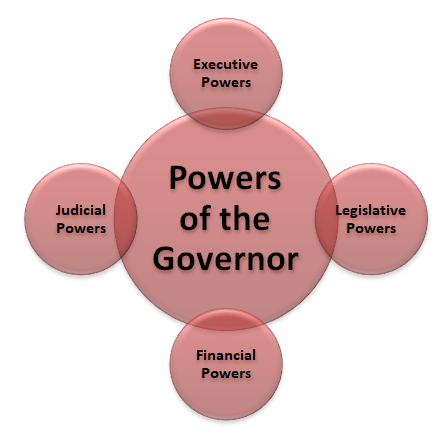
1. Executive Powers of the Governor
The following comes under his executive powers:
- Every executive action that the state government takes, is to be taken in his name.
- How an order that has been taken up his name is to be authenticated, the rules for the same can be specified by the Governor.
- He may/may not make rules to simplify the transaction of the business of the state government.
- Chief Ministers and other ministers of the states are appointed by him.
- It is his responsibility to appoint Tribal Welfare Minister in the states of:
- Chattisgarh
- Jharkhand
- Madhya Pradesh
- Odisha
- He appoints the advocate general of states and determines their remuneration
- He appoints the following people:
- State Election Commissioner
- Chairman and Members of the State Public Service Commission
- Vice-Chancellors of the universities in the state
- He seeks information from the state government
- A constitutional emergency in the state is recommended to the President by him.
- The governor enjoys extensive executive powers as an agent of the President during the President’s Rule in the state.
2. Legislative Powers of the Governor
The following are the legislative powers of the governor:
- It’s in his power to prorogue the state legislature and dissolve the state legislative assemblies
- He addresses the state legislature at the first session of every year
- If any bill is pending in the state legislature, Governor may/may not send a bill to the state legislature concerning the same
- If the speaker of the legislative assembly is absent and the same is Deputy Speaker, then Governor appoints a person to preside over the session
- As President nominates 12 members in Rajya Sabha, Governor appoints ⅙ of the total members of the legislative council from the fields of:
- Literature
- Science
- Art
- Cooperative Movement
- Social Service
- As President nominates 2 members in the Lok Sabha, Governor nominates 1 member in state legislative assembly from Anglo-Indian Community.
- He can consult Election Commission for the disqualification of members
- With respect to the bill introduced in the state legislature, he can:
- Give his assent
- Withhold his assent
- Return the bill
- Reserve the bill for the President’s consideration (In instances where the bill introduced in the state legislature endangers the position of state High Court.)
Note: Governor can reserve the bill for the President’s consideration in the following cases:
- When provisions mentioned in the bill violates the constitution (Ultra-Vires)
- When provisions mentioned in the bill oppose Directive Principles of State Policy.
- When provisions mentioned in the bill hinders the larger interests of the country
- When provisions mentioned in the bill concern the national importance
- When provisions mentioned in the bill mention the acquisition of property that is dealt with Article 31A in the constitution.
Further,
- An ordinance can be promulgated by him when either the Legislative Assembly or Council (Unicameral/Bicameral) are not in session.
- The following reports are laid by him:
- State Finance Commission
- State Public Service Commission
- Comptroller and Auditor General (Concerning the state finance)
3. Financial Powers of the Governor
The following are the financial powers and functions of the Governor:
- He looks over the state budget being laid in the state legislature
- His recommendation is a prerequisite for the introduction of a money bill in the state legislature
- He recommends for the demand for grants which otherwise cannot be given
- Contingency Fund of State is under him and he makes advances out that to meet unforeseen expenditure.
- State Finance Commission is constituted every five years by him.
4. Judicial Powers of the Governor
The following are the judicial powers and functions of the Governor:
- He has the following pardoning powers against punishment:
- Pardon
- Reprieve
- Respite
- Remit
- Commute
- President consults the Governor while appointing judges of High Court.
- In consultation with the state High Court, Governor makes appointments, postings, and promotions of the district judges.
- In consultation with the state high court and state public service commission, he also appoints persons to the judicial services.
Some other powers of the Governor are:
- Emergency Powers of Governor: The governor has the power to make a report to the President, whenever he is satisfied that a situation has arisen in which the Government of State cannot be carried on in accordance with the provisions of the Constitution (given in Article 356), thereby, inviting the President to assume to himself the functions of the government of the stae or any of them. When the President’s rule is imposed in as state, an important change in the position of the Governor takes place. Instead of being a constitutional head of the State, who is guided by his Council of Ministers in the discharge of his duties, he becomes the “agent of the Union Government in the state”. He takes over the reins of administration directly into his own hands and runs the State with the aid of the civil services. thus, during the period of emergency, the executive power of the State is exercised by the Governor in accordance with the instructions received from the President.
- Discretionary Powers of Governor: The Governor of state, unlike the President of India, is conferred with power to act at his own discretion. There are two categories of discretion for the governor. One is Constitutional Discretion and the other is Situational Discretion.
Important points of difference between President and Governor to be remembered:
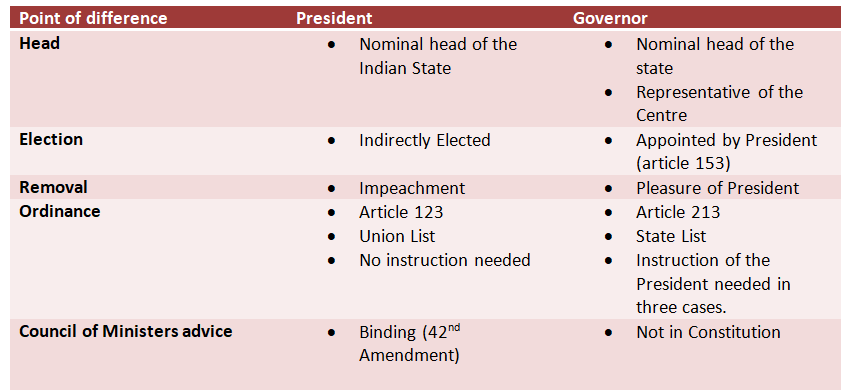
Comparison of Veto powers of President and Governor in case of ordinary bills and money bills:
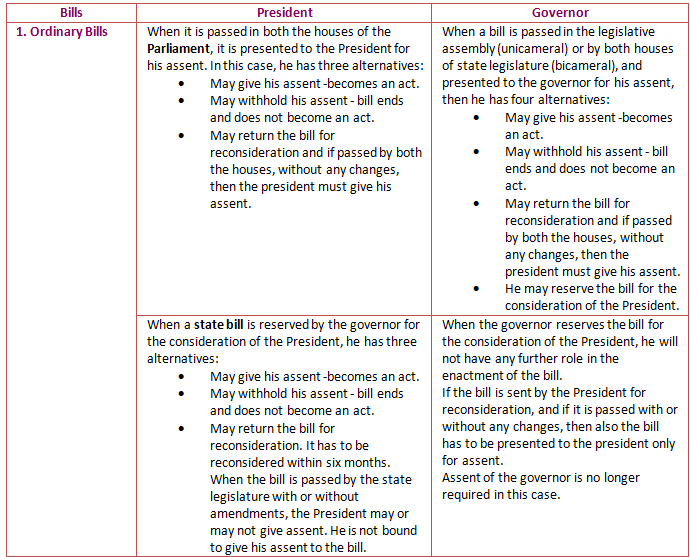
Comparison of Ordinance making power of President and Governor:
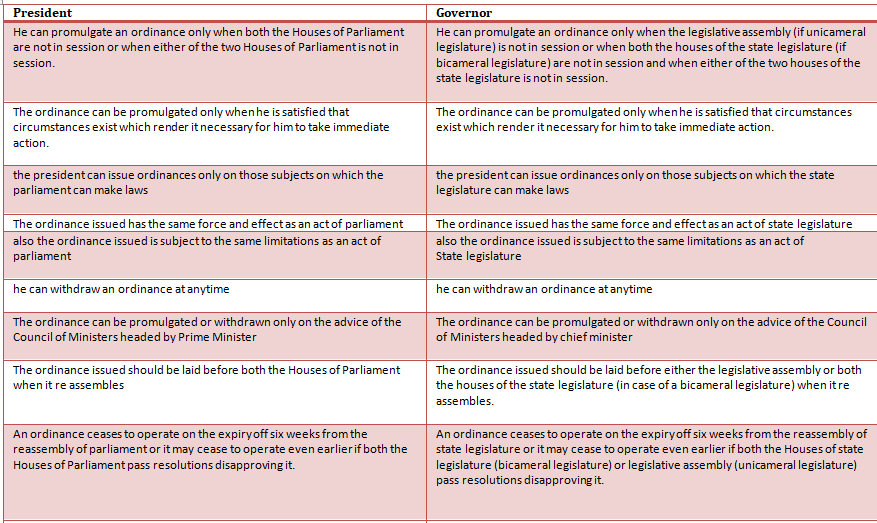

Comparison of Pardoning Powers of the President and Governor:
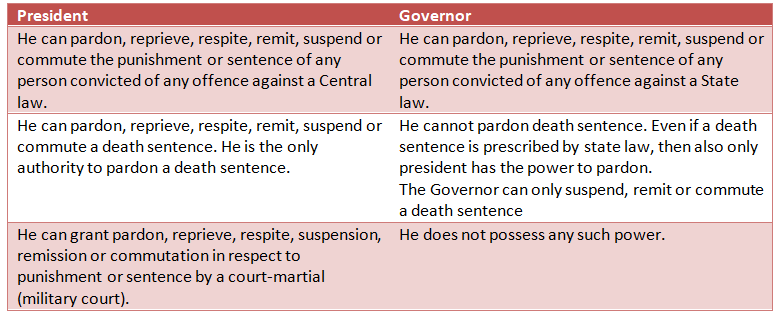


![Prayas-लक्ष्य [UPSC CSE Target] The Prayas India](https://theprayasindia.com/wp-content/uploads/2021/08/Prayas-लक्ष्य-UPSC-CSE-Target-The-Prayas-India-300x167.png)

![Prayas Pre-भेदश [UPSC CSE Prelims Test Series] The Prayas India](https://theprayasindia.com/wp-content/uploads/2021/08/Prayas-Pre-भेदश-UPSC-CSE-Prelims-Test-Series-The-Prayas-India-300x167.png)






